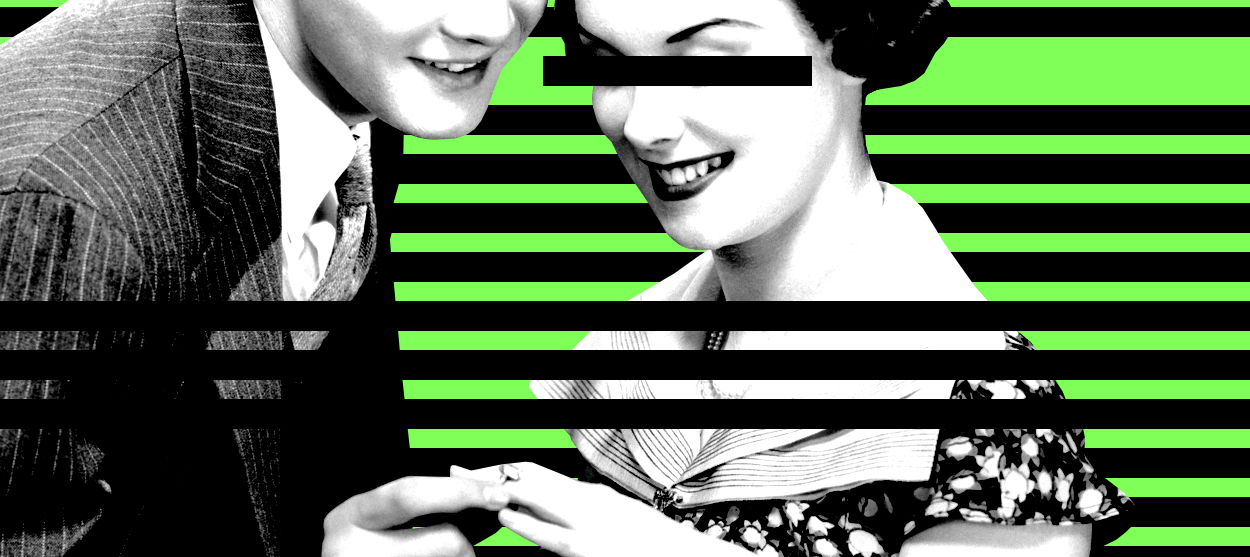Why I bristled at becoming a 'wife'
Call me a wife. But don't call me a ball and chain.


A free daily email with the biggest news stories of the day – and the best features from TheWeek.com
You are now subscribed
Your newsletter sign-up was successful
As of this week, my husband and I will have celebrated 10 Valentine's Days together. At some point in the evening, he'll reach across the table and motion for me to take his hand. "I'm so glad we're married," he'll say. "I'm so glad you're my wife." And I'll think, again, about how odd that word feels as it lands on my shoulders.
Before we got hitched, I hadn't thought terribly hard about taking on the label of "wife." I was mostly just excited to marry this person I loved. For the first few days afterward, he and I reveled in our new titles, finding ways to work them into every conversation. "Yes, my WIFE will be joining us for dinner." "This is my HUSBAND, have you two met?"
Unexpectedly, though, I soon found myself bristling. Something about this new identity felt itchy, ill-fitting. I thought it was the novelty, or maybe the grown-up-ness of it, like playing dress-up in my mother's clothes. I figured I'd get used to it.
The Week
Escape your echo chamber. Get the facts behind the news, plus analysis from multiple perspectives.

Sign up for The Week's Free Newsletters
From our morning news briefing to a weekly Good News Newsletter, get the best of The Week delivered directly to your inbox.
From our morning news briefing to a weekly Good News Newsletter, get the best of The Week delivered directly to your inbox.
Then, a few weeks after we got married, we moved into a new place. For me, as a freelancer, this involved carving out space to work amidst the chaos of boxes and dollies. One morning, I camped out on a folding chair in our new living room, typing frantically on my laptop, while my husband ran interference with a repairman. "My wife" — I heard the little thrill in his voice — "is on an urgent deadline. Can we make sure the internet connection is up and running as soon as possible?"
"Oh, sure thing," the repairman replied cheerfully, as if I weren't there. "Last thing I need is an angry wife." He laughed at the private joke he'd just tossed off — directed at my husband, but at my expense.
I felt a flush creep up the sides of my face; my eyes stung. To this stranger in my house, I wasn't a professional working on a deadline, or even a client worth making small talk with. I was just a "wife" — a creature whose sole purpose was to make the men around me miserable if my demands were not met. And I knew that if I expressed any distress or frustration at his supposed joke, my "angry wife" status would be confirmed.
Suddenly, all the itching and bristling of the previous few weeks began to make sense. I was chafing at the label of "wife," not because it was unfamiliar, but because it was familiar in a way I didn't like. By putting my name on that marriage license, I'd been cast in a Henny Youngman one-liner — "Take my wife … please!" — without my input or consent.
A free daily email with the biggest news stories of the day – and the best features from TheWeek.com
My experience is by no means universal. For many queer married couples, the title of "wife" has an entirely different weight and shading. And I know women married to men who have chosen not to take on the label of "wife" at all. But for me, having blithely assumed that "husband" and "wife" were symmetrical terms, I soon discovered that my new title came with baggage I didn't want and didn't know how to shed.
Our culture is heavy with imagery of heteronormative partnerships as battlegrounds, and male-female partners as combatants. How often do we see pop-culture tropes of men openly criticizing their female partners for expressing needs and desires that conflict with theirs — like, say, being home at a reasonable hour after a night out with friends? How many variations of "Take my wife ... please!" do we hear on a regular basis, both in pop culture and out of the mouths of people we know?
These expectations are not exclusive to marriage, but our notions of marriage amplify them in strange ways. In this narrative, women and men conduct relationships with each other at cross purposes: The feminine drive is for more commitment, and the masculine drive is for less. I think of the classic wedding cake topper of the bride dragging the groom behind her to the altar, her fingers gripping the collar of his tux jacket.
This narrative of marriage isn't borne out by research. In survey after survey, men appear to benefit from participating in the culturally privileged institution of marriage just as much as, if not more than, their wives do. But still, the "ball and chain" narrative remains a staple of our cultural diet. Which means that, when a marriage between a man and a woman takes place, it's often tacitly assumed that the woman has "won." She has, at least in some form, wrested power from her partner. And our American patriarchy doesn't look kindly on powerful women.
Whether or not the torrent of wife jokes is intended as oppressive, I can't help thinking of it as yet another way of keeping women in our place. It's a reminder that women exercising power — perceived or actual — is monstrous, and the last thing we should want is to be monsters. Newly-married me bristled at being called a wife, because I didn't want to be thought of as a harpy or a shrew. But the repairman's joke brought home to me that I had no choice in the matter.
And these jokes serve a parallel purpose: They keep men in their place, too. Our patriarchal society runs on a toxic version of masculinity, in which only a limited range of emotions are acceptable for men to express. Conveniently, these emotions — like anger, frustration, contempt — dovetail nicely with the mandate to be suspicious of women, to talk and think about them as antagonists.
Of course, these are not the only feelings men have about their partners. Forming intimate relationships with others, whether romantic or non-romantic, means being alive to the full breadth of human emotion. When men are taught to be toxic rather than tender — to deny the affection they feel towards the women in their lives — they are, in effect, being asked to suppress a portion of their humanity.
I am lucky to be surrounded by gentle, tender men. I have seen the pain that these toxic expectations can cause: the push-pull between wanting to feel masculine and craving outlets for softer feelings. And I have also watched these men find ways to be secure in their masculinity, without engaging in the enforced negativity of wife-talk. My husband says that telling the world how much he adores his wife feels as natural as breathing.
So I'm making peace with my status as a "wife." It still feels a little ill-fitting; I still bristle at wife jokes. The baggage isn't fully unpacked. But I'm working on it, and hoping that, little by little, we can chip away at the cultural messaging that tells wives we are not to be trusted, and husbands not to trust us.
Want more essential commentary and analysis like this delivered straight to your inbox? Sign up for The Week's "Today's best articles" newsletter here.
Zoe Fenson is a freelance writer based in the San Francisco Bay Area. Her writing has appeared in Longreads, Narratively, The New Republic, and elsewhere. When she's not writing, you'll find her doing crossword puzzles in cocktail bars or playing fetch with her cat.
